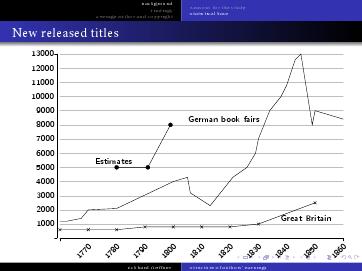
Against Monopoly
defending the right to innovate
copyright
Monopoly corrupts. Absolute monopoly corrupts absolutely.
Copyright Notice: We don't think much of copyright, so you can do what you want with the content on this blog. Of course we are hungry for publicity, so we would be pleased if you avoided plagiarism and gave us credit for what we have written. We encourage you not to impose copyright restrictions on your "derivative" works, but we won't try to stop you. For the legally or statist minded, you can consider yourself subject to a Creative Commons Attribution License.
current posts | more recent posts | earlier posts
The bionic man
[Posted at 06/12/2010 03:38 AM by David K. Levine on Copyright  comments(0)]
comments(0)]
World War 0
In 1815 the German confederation consisted of 39 states with no effective copyright. At that time Great Britain was a monolithic state in which the well enforced copyright had just been extended to 28 years or the life of the author. Germany was a bit larger in population about 27 million against 17 million, but population in England was growing much more rapidly, was concentrated in urban areas and England was a much richer nation. So many more titles were produced in England obviously with all that extra incentive from copyright.
A picture speaks louder than words

Eckhard goes on to analyze how authors fared with and without copyright. The bottom line: the journeyman author - those who produce most of the books - did better without copyright. The big guys at the top? They did better with copyright.
For all the details you can find Eckhard's slides here, and I am sure more is to come.
[Posted at 06/05/2010 08:09 AM by David K. Levine on Copyright  comments(49)]
comments(49)]
Canada to "modernize" copyright law
For those of you who have been counting, this is the third effort, in the past five years, by Canada to amend the Copyright Act. The previous two each died on their order papers - victims of Parliamentary instability. That is unlikely to happen this time. It appears the government will endeavor to fast-track the bill into law.
[Posted at 06/02/2010 01:29 PM by Meera Nair on Copyright  comments(13)]
comments(13)]
Where is the justice?

[Posted at 05/18/2010 06:29 AM by John Bennett on Copyright  comments(1)]
comments(1)]
Our government makes up data?
[Posted at 04/14/2010 08:35 AM by Stephen Spear on Copyright  comments(0)]
comments(0)]
A Creative Illustration Of What Is Possible If People Simply Ignore The Current Overly Restrictive Copyright Regime
http://www.huffingtonpost.com/2010/04/13/star-wars-uncut-fans-recr_n_536332.html
[Posted at 04/14/2010 01:54 AM by Justin Levine on Copyright  comments(22)]
comments(22)]
The Economist: "Why the rules on copyright need to return to their roots"
The opinion piece goes on to make a series of familiar arguments; that the belief that extension of a copyright's term increases creativity is questionable and that current lengths discourage creativity when the penalties even for inadvertent infringement are draconian as is often the case. It also asserts, "Authors and artists do not generally consult the statute books before deciding whether or not to pick up pen or paintbrush." It ends by noting that a return to the earlier much shorter term of copyright would be "arbitrary but not unreasonable." And "[i]f there is a case for longer terms, they should be on a renewal basis, so that content is not locked up automatically." "[F]air use needs to be expanded and inadvertent infringement should be minimally penalized."
Well reasoned and stated.
[Posted at 04/12/2010 02:55 AM by John Bennett on Copyright  comments(0)]
comments(0)]
More about the Encouragement of Learning
The Statute of Anne makes for interesting reading.
For instance, if books were perceived as overpriced, any individual could make a complaint to the authorities (among them the Lord Archbishop of Canterbury, the Lord Chief Justice of the Common Court, the Vice-Chancellors of the Universities of Oxford and Cambridge). Booksellers and printers could be summoned to justify the "reason of dearness." If the price was found to be excessive, the authorities could, "limit and settle the price for every such printed book."
And for each book printed, "nine copies upon the best paper," were to be reserved for "the Royal Library, the Libraries of the Universities of Oxford and Cambridge, the Libraries of the Four Universities in Scotland, the Library of Sion College in London, and the Library commonly called the Library belonging to the Faculty of Advocates at Edinburgh." If delivery of books did not take place within ten days after receiving a demand from a library, the offender was fined five pounds (per book).
What would five pounds in 1710 be equivalent to today?
[Posted at 04/09/2010 08:41 PM by Meera Nair on Copyright  comments(2)]
comments(2)]
You don't say??
[Posted at 04/09/2010 12:23 PM by David K. Levine on Copyright  comments(2)]
comments(2)]
Headline stock news delayed to the benefit of big traders
The court found that fair use was topped by the "hot news" doctrine, which protects organizations from theft by competitors. The ruling clearly gives big Wall Street clients a head start each trading day. "The banks claimed Fly's practice of publishing pieces of research reports almost instantly undercut their work by making key nuggets meant for exclusive client use available to a wider audience immediately. Why would clients pay big money those reports--which themselves cost the banks money to produce--if Fly was going to publish the important stuff right away? link here
Fly will appeal. The monopolists win, if only for the moment, but the lawyers profit, no matter what.
[Posted at 03/23/2010 06:52 AM by John Bennett on Copyright  comments(41)]
comments(41)]


Most Recent Comments